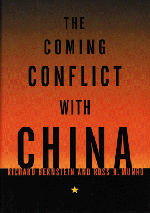GOLDSEA | ASIAN BOOKVIEW | NONFICTION
The Coming Conflict with Chinaby Richard Bernstein and Ross H. Munro
Knopf, New York, 1996, 245pp, $23
Argues that a showdown between China and the U.S. is inevitable.
EXCERPT:
 n the early months of 1994, a large number of Communist Party officials from all of China's provinces were summoned to a meeting in Beijing. The secretaries and propaganda chiefs of party committees from every one of China's twenty-nine provinces and regions were there, and so were delegates from the major central government agencies and the provincial and big-city governments. The attendees, gathered in the Great Hall of the People, which squats massively on the west side of Beijing's immense Tiananmen Square, were soon told the reason for the meeting. It was to designate the United States as China's main global rival and to announce an eventual aim: setting up "a global antihegemonist united front at an opportune moment."
n the early months of 1994, a large number of Communist Party officials from all of China's provinces were summoned to a meeting in Beijing. The secretaries and propaganda chiefs of party committees from every one of China's twenty-nine provinces and regions were there, and so were delegates from the major central government agencies and the provincial and big-city governments. The attendees, gathered in the Great Hall of the People, which squats massively on the west side of Beijing's immense Tiananmen Square, were soon told the reason for the meeting. It was to designate the United States as China's main global rival and to announce an eventual aim: setting up "a global antihegemonist united front at an opportune moment."
In the carefully crafted attack vocabulary of China, the word "hegemonist" has a special meaning. It refers to a country that is so powerful in Asia that China's independence and sovereignty is threatened by it. For many years, in fact, from the 1960s to the 1980s, the word had been reserved exclusively for the Soviet Union, China's chief enemy during those decades. But there was little question as to who the "hegemonist" in question was at this meeting in early 1994. The main address at the conference, given by Chief of the General Staff Zhang Wannian, was entitled "Reinforcing the Army, Accelerating the Army's Modernization, Firmly Opposing Interference and Subversion from Hegemonism, and Defending the Motherland." General Zhang's central statement: "Facing blatant interference by the American hegemonists in our internal affairs and their open support for the debilitating activities of hostile elements inside our country and hostile forces outside the mainland and overseas opposing and subverting our socialist system, we must reinforce the Armed Forces more intensively."

Zhang's accusation, that the United States was giving "open support" to "hostile" forces inside China, involved the kind of language that, even given China's propensity for rhetorical posturing, has hardly been heard since the late 1960s, when America was still portrayed in endlessly repeated boilerplate phrases as the great imperialist enemy. Certainly it was the language of the sort of aggressive posture that China has assumed toward the United States, whether in testing American resolve on such matters as arms proliferation, violating international human rights standards, or engaging in an ambitious military buildup. As if to show that Zhang's language was no accidental burst of verbal excess, other speakers at that meeting made a point of echoing his anti-American phrases. Speaking for the Politburo, the highest expression of the CCP, the Chinese Communist Party, was Hu Jintao, a member of the Politburo Standing Committee. Hu told the assembled party bureaucrats: "According to the global hegemonist strategy of the United States, its main rival at present is the PRC. Interfering in China, subverting the Chinese government and strangling China's development are strategic principles pursued by the United States." Ding Guangen, another Politburo member and the official guardian of party ideology, spoke on the "propaganda work" that now needed to be done. Some of his points:
- The anti-China strategy of the United States is aimed at strangling China's socialism and reducing China to an vassal state.
- The United States is interfering in China's internal affairs under the pretext of human rights and it makes judgments in terms of ideology. This is a subversive strategy.
- The United States supports and uses hostile forces and elements in China to carry out subversive and seditious activities.
ASIAN AIR ISSUES FORUM |
CONTACT US
© 1999-2003 GoldSea
No part of the contents of this site may be reproduced without prior written permission.
